Suchergebnisse für "Factsheet: Energietechnologien gestalten, die für alle sinnvoll und nutzbar sind"
Aktoren unterstützte, adaptive Verbrennungsoptimierung zur Feinstaubreduzierung
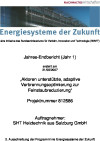
Dipl.-Ing. Herbert Hartl, MBA
Herausgeber: Bundesministerium für Verkehr, Innovation und Technologie
Downloads zur Publikation
Aufarbeitung von Filterrückständen bei der Bierherstellung zur Gewinnung einer innovativen pharmazeutischen Substanz
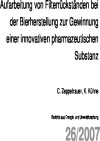
Schriftenreihe
26/2007
C. Zeppelzauer, K. Kühne
Herausgeber: Bundesministerium für Verkehr, Innovation und Technologie
Deutsch, 43 Seiten
Downloads zur Publikation
Energieforschungsstrategie Österreich

Making the Zero Carbon Society Possible!
Michael Cerveny, Johannes Gadner, Anton Graschopf, Michael Paula
Herausgeber: Rat für Forschung und Technologieentwicklung
Deutsch, 56 Seiten
Downloads zur Publikation
Erstellung eines Konzeptes zur Entwicklung der "Dienstleistung Schmierung" zur Maximierung der Anlagenlebensdauer auf Basis von Ionischen Flüssigkeiten als Spezialschmiermittel
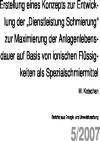
Schriftenreihe
05/2007
DI Dr. Michael Kotschan MBA
Herausgeber: Bundesministeriums für Verkehr, Innovation und Technologie
Deutsch, 43 Seiten
Downloads zur Publikation
RepaMobil
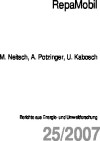
Abbau von Markthemmnissen bei haushaltsnahen Produkt-Dienstleistungs-Systemen, insbes. Reparaturleistungen, durch Servicestellen an Standorten mit hoher Kundenfrequenz
Schriftenreihe
25/2007
M. Neitsch, A. Potzinger, U. Kabosch
Herausgeber: Bundesministerium für Verkehr, Innovation und Technologie
Deutsch, 158 Seiten
Downloads zur Publikation
FABRIK der Zukunft Hintergrundband Teil 1, Auflage 1
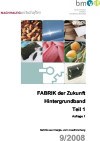
Sammlung von Projektergebnissen aus der Programmlinie FABRIK der Zukunft
Schriftenreihe
09/2008
Hans-Günther Schwarz, Mag. Sabine List
Herausgeber: Bundesministerium für Verkehr, Innovation und Technologie
Deutsch, 206 Seiten
Downloads zur Publikation
Ecological Passive houses

Discussion of transfer of know how for ecological passivehouses, networking (national and international)
Monitoring von Plusenergie-Gebäuden - Leitfaden (Nov. 2014)
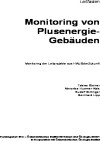
Monitoring der Leitprojekte aus Haus der Zukunft
Tobias Steiner, Veronika Huemer-Kals, Rudolf Bintinger, Bernhard Lipp
Herausgeber: IBO - Österreichisches Institut für Bauen und Ökologie GmbH in Kooperation mit Österreichisches Ökologie-Institut
Deutsch, 74 Seiten
Downloads zur Publikation
Nachhaltiges Bauen tatsächlich & nachweislich in Österreich - Weißbuch 2015 (Nov. 2014)
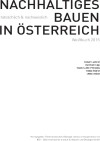
Robert Lechner, Bernhard Lipp, Beate Lubitz-Prohaska, et al.
Herausgeber: Österreichisches Ökologie-Institut in Kooperation mit IBO - Österreichisches Institut für Bauen und Ökologie GmbH
Deutsch, 104 Seiten
Downloads zur Publikation
Inter-linked design as a strategy towards sustainable buildings - removing deficiencies of learning and of diffusion

The aim is to investigate the role of inter-linked design team organisation in the design of sustainable buildings and to formulate ready-to-use recommendations and guidelines for dissemination.
Development and application of an consultancy model to promote sustainable building design

Development of an consultancy model to promote ecologic and economic sustainable building solutions within the planning process. Analysis of the efficiency of guided (integral) meetings with architects, planners, and experts for different items.
HY3GEN
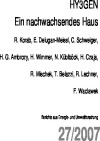
Ein nachwachsendes Haus
Schriftenreihe
27/2007
R. Korab, E. Delugan-Meissl, C. Schweiger, H. G. Ambrozy, H. Wimmer, N. Küblböck, H. Czaja, R. Mischek, T. Belazzi, R. Lechner, F. Waclawek
Herausgeber: Bundesministerium für Verkehr, Innovation und Technologie
Deutsch, 186 Seiten
Downloads zur Publikation
International eco-label for sustainable building products

Standardisation of testing criteria of acknowledged eco-labels in co-operation with the specialised trade for building products.
Innovative Refurbishment of Single Family Houses

Evaluation of best-practice models and recommendations to support dissemination
Investigations on the Fundamental Suitability of Sprayed-on and Plaster-covered hygrothermic active Cellulose-Compact-Soundabsorber

Development of a new kind of spray-on and plastered noise absorber on the basis of cellulose from recycled paper. The absorber system preferably attenuates the low-frequency range, that can usually only be controlled with rather complex systems, and can also be used where conventional absorbers could cause problems due to impermissible water vapour condensation.
Hygrothermal behaviour of double-skin facades in solar irradiation - theory evaluation by means of on-location measurements

Detailed clarification of the base parameters of thermodynamic simulation calculations by means of on-location measurements on the five-storey double-skin facade of the Federal Institute of Social Education in Baden bei Wien
Energy Innovations made in Austria - The Green Deal for a Climate-Neutral Future
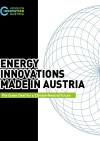
This brochure presents the latest findings in energy research in Austria with examples from cities of tomorrow, decarbonisation of industry, digital transformation and green hydrogen.
Herausgeber: Bundesministerium für Klimaschutz, Umwelt, Energie, Mobilität, Innovation und Technologie (BMK), Klima- und Energiefonds, June 2020
Englisch, 36 Seiten
Downloads zur Publikation
Autofreier Tourismus In Österreich
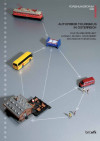
Das Tälerbusprojekt Lungau, Murau, Nockgebiet - ein innovatives Model
Forschungsforum
3/1995
Herausgeber: BMVIT
Deutsch, 6 Seiten
Downloads zur Publikation
Smart grids for a sustainable energy supply system
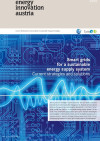
Current strategies and solutions
energy innovation austria
2/2016
Herausgeber: BMVIT und Klima- und Energiefonds
Englisch, 8 Seiten
